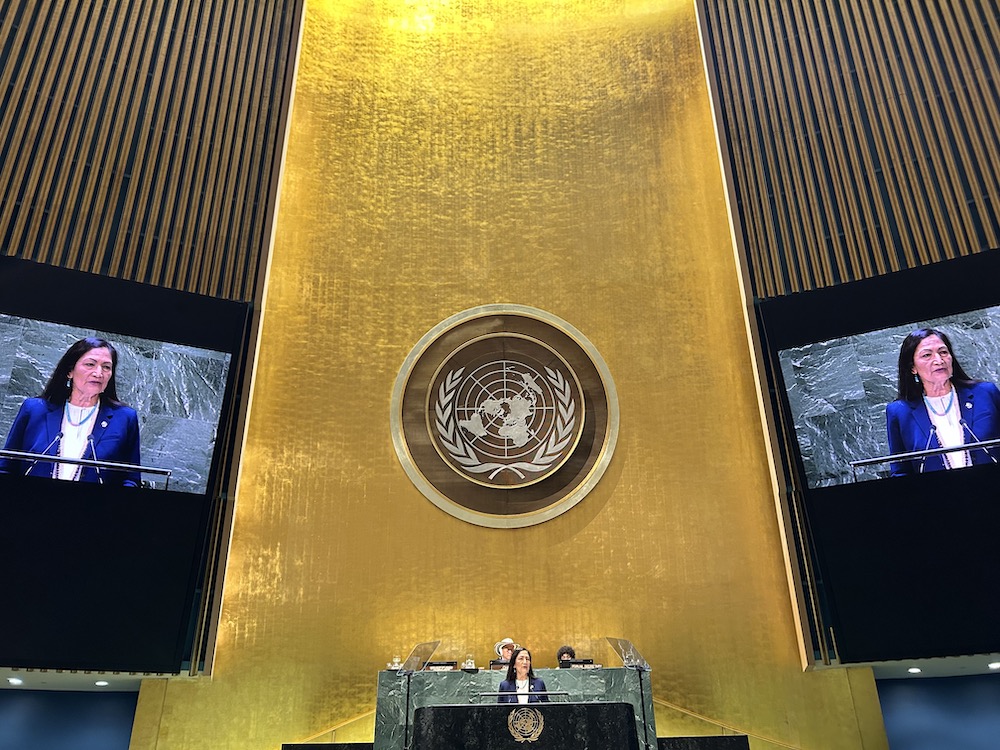
- Details
- By Jenna Kunze
This story is published as part of the Global Indigenous Affairs Desk, an Indigenous-led collaboration between Grist, High Country News, ICT, Mongabay, and Native News Online.
NEW YORK—Colorful Indigenous regalia replaced suits and ties in the United Nations General Assembly hall earlier today, as Native leaders from around the globe sat side by side for the opening ceremony of the United Nations Permanent Forum on Indigenous Issues.
The Permanent Forum is a U.N. advisory body that is mandated to deal with Indigenous Peoples’ issues related to economic and social development, culture, the environment, education, and health and human rights. The Permanent Forum has convened annually at the U.N. headquarters in New York City since 2002, excluding pandemic years when the forum met mostly virtually.
Each forum also centers on a specific theme. This year’s forum is built around the theme of “Indigenous Peoples, human health, planetary and territorial health and climate change: a rights-based approach.”
This year also marks the first time the forum resumed its fully in-person session since the pandemic began, and it showed. The General Assembly hall was nearly full—with more than 2,000 registered participants.
“There's a lot more people from the United States compared to last year,” Shawnee Tribal Chief Ben Barnes told Native News Online. Chief Barnes said he could tell by the reaction of the room when Department of the Interior Secretary Deb Haaland (Laguna Pueblo) took the stage to loud whistles and cheering from those in attendance.
“Indigenous peoples are experiencing a new era unfolding worldwide,” Haaland said during the opening ceremony. “It's being reaffirmed as institutions like the Vatican are rejecting and rescinding the very doctrine used to falsely justify missteps and destruction of our lands, people, and identities for hundreds of years.”
Her speech focused largely on the empowerment of Indigenous women and girls, a theme that persisted throughout day one of the forum.
“Nations must address the violence and severe gender inequities that persist for Indigenous communities globally, particularly Indigenous women and girls,” Haaland said. “Indigenous women and girls are … best positioned to uplift the needs of their communities and advance climate crisis solutions. If we do not empower women everywhere as innovators and leaders, our global climate goals cannot proceed.”
Following the opening ceremony, member states and Indigenous Peoples Organizations—as the U.N. calls any tribal nation or non-profit—spoke about the continued discrimination and violence many Indigenous women and girls face.
In 1979, the United Nations adopted the Convention on the Elimination of All Forms of Discrimination against Women (CEDAW). It became an international treaty and human rights legislation for women two years later, after 20 countries ratified the treaty, making its laws binding. Today, 189 of 194 countries have ratified the treaty; the United States is not one of them.
Countries that ratify the treaty are required to:
- Eliminate all forms of discrimination against women in all areas of life;
- Ensure women’s full development and advancement in order that they can exercise and enjoy their human rights and fundamental freedoms in the same way as men; and
- Allow the CEDAW Committee to scrutinize their efforts to implement the treaty by reporting to the body at regular intervals.
A body of independent experts that monitors the implementation of human rights legislation, CEDAW provided a 25-page report of guidance to countries on legislation they can enact to ensure the rights of Indigenous women and girls.
Speakers from Greenland, Canada, the United States, Canada, Norway, Australia, and the Office of the High Commissioner for Human Rights (OHCHR) supported the recommendation, called General Recommendation No. 39 on Indigenous Women and Girls.
“Although Indigenous women in Canada are strong and resilient, we continue to face systemic discrimination and deep-rooted racism as evidenced by persistent social, economic, political, and violence against our mothers,” Cora McGuire-Cyrette, the executive director of the Ontario Native Women's Association (ONWA) said. “General recommendation 39 is a critically necessary document for Indigenous women’s rights. Yet, it is only as good as its implementation. More must be done to hold governments accountable.”
Stay tuned for more updates from the United Nations this week. Native News Online is also partnering with the Global Indigenous Affairs Desk, an Indigenous-led collaboration between Grist, High Country News, ICT, and Mongabay.
More Stories Like This
Chickasaw Lighthorse Police Officer named Indian Country Law Enforcement Officer of the YearIndian Gaming Association Rallies Broad Coalition Against Sports Event Contracts It Calls Illegal Threat to Tribal Sovereignty
Navajo Resources and Development Committee Issues Notice on Livestock Inspection Requirements
American Prairie, Tribal Coalition Files Protest Over Rescinded Grazing Rights
Northern Cheyenne Push Back Against Trump Administration’s Effort to Alter Little Bighorn History
Help us defend tribal sovereignty.
At Native News Online, our mission is rooted in telling the stories that strengthen sovereignty and uplift Indigenous voices — not just at year’s end, but every single day.
Because of your generosity last year, we were able to keep our reporters on the ground in tribal communities, at national gatherings and in the halls of Congress — covering the issues that matter most to Indian Country: sovereignty, culture, education, health and economic opportunity.
That support sustained us through a tough year in 2025. Now, as we look to the year ahead, we need your help right now to ensure warrior journalism remains strong — reporting that defends tribal sovereignty, amplifies Native truth, and holds power accountable.
 The stakes couldn't be higher. Your support keeps Native voices heard, Native stories told and Native sovereignty defended.
The stakes couldn't be higher. Your support keeps Native voices heard, Native stories told and Native sovereignty defended.
Stand with Warrior Journalism today.
Levi Rickert (Potawatomi), Editor & Publisher


